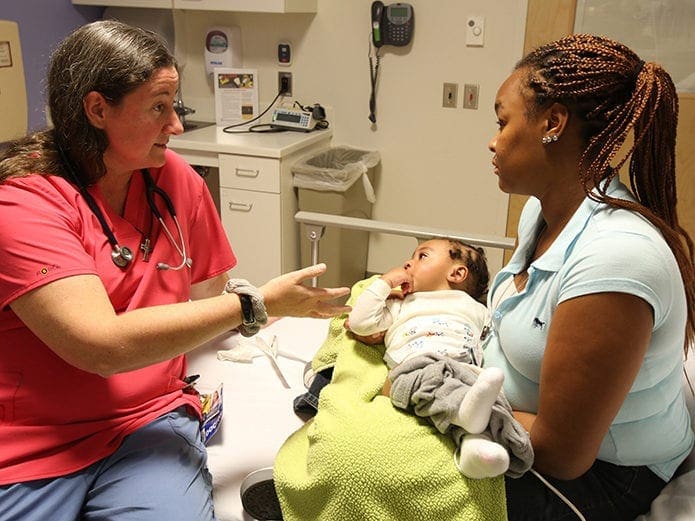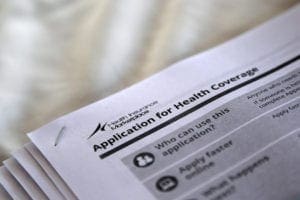 CNS photo/Bob Roller
CNS photo/Bob RollerWashington DC
Health care might not be top election issue but is still voter priority
By CAROL ZIMMERMANN, Catholic News Service | Published October 20, 2016
 WASHINGTON (CNS)—Health care got plenty of attention during previous presidential election campaigns, but this time around it is almost like a kid craning to see what is going on while other issues take the front seat.
WASHINGTON (CNS)—Health care got plenty of attention during previous presidential election campaigns, but this time around it is almost like a kid craning to see what is going on while other issues take the front seat.
A Pew Research Center poll this summer placed health care behind the economy, terrorism and foreign policy among voters’ concerns and just above gun policy and immigration.
One reason it’s likely not a top issue is that the often contentious Affordable Care Act—which became law in 2010 and was fully implemented in 2015—has now been upheld twice by the U.S. Supreme Court.
A recent poll by Kaiser Family Foundation found that fewer than half of respondents wanted elected officials to focus on the Affordable Care Act and less than one-third wanted it fully repealed.
“Health is really a pocketbook issue more than a political issue now,” said Drew Altman, foundation president.

The federal government forms for applying for health coverage are seen at a 2013 rally held by supporters of the Affordable Care Act at a health care center in Jackson, Miss. A poll by Kaiser Family Foundation this summer found that fewer than half of respondents wanted their elected officials to deal with concerns about the Affordable Care Act and one-third wanted it fully repealed.CNS photo/Jonathan Bachman, Reuters
But when presidential candidates discuss health care, the Affordable Care Act is the first thing they mention. Democrat Hillary Clinton promises to defend and expand it, while Republican Donald Trump says he will urge Congress to repeal it.
The Catholic Church has had a complicated relationship with the law. Catholic hospitals have long emphasized that the poor and vulnerable must receive access to health care, and the U.S. Conference of Catholic Bishops, in a 2010 letter to Congress, stressed that health care is “a basic human right” and “universal coverage should be truly universal.”
But a major sticking point with the legislation for church leaders is its contraceptive mandate, challenged in courts and sent back to the lower courts by the Supreme Court this summer. The dispute is over the Department of Health and Human Services’ requirement that contraceptive coverage must be included in most employees’ health plans. The HHS rule provided a narrow religious exemption that applied to houses of worship but not most religious universities, schools, social service agencies, outreach ministries or health care providers.
In May, the Supreme Court said religious employers and the government should be given the chance to find an approach that accommodates petitioners’ religious exercise while at the same time ensuring that women covered by petitioners’ health plans receive contraceptive coverage.
A Sept. 9 letter from USCCB officials to the HHS stressed that such a compromise can be reached to satisfy the government and religious groups.
For that to happen, the letter said, “any government-mandated contraceptive coverage must be truly independent of petitioners and their plans” meaning it should be offered through a separate policy, with a different enrollment process, insurance card and a payment source.
The letter also said such coverage should not be automatic to protect conscience rights of people who might have religious objections to contraception and sterilization coverage.
“Forming Consciences for Faithful Citizenship,” the bishops’ document on political responsibility that guides Catholics on election decisions, states that “affordable and accessible health care is an essential safeguard of human life and a fundamental human right.” It notes that despite an increase in the number of people insured, “millions of Americans still lack health care coverage” which it describes as “an urgent national priority.”
The document also notes that the country’s health care system needs to be “rooted in values that respect human dignity, protect human life, respect the principle of subsidiarity and meet the needs of the poor and uninsured, especially born and unborn children, pregnant women, immigrants and other vulnerable populations.”
It also states that employers, including religious groups and family-owned businesses, “should be able to provide health care without compromising their moral or religious convictions, and individuals should be able to purchase health care that accords with their faith”—which still remains unresolved.
The bishops’ guide also notes that it supports measures to strengthen Medicare and Medicaid and advocates for effective, compassionate care for those suffering from HIV/AIDS or coping with addictions.
Sister Carol Keehan, a Daughter of Charity and president and CEO of the Catholic Health Association, said Catholic voters should be concerned that health care is accessible to everyone and that “people get health care they need, not health care they can afford.”
She said voters should support candidates who want to improve the Affordable Care Act and look for ways to expand it in states where people still are not covered.
A pivotal concern for the United States, she added, is that millions of people still do not have access to health care, which she said has been a clear teaching of the popes from the previous eight or 10 popes to Pope Francis. She also stressed that “affordable health care is a nonnegotiable priority in church teaching” and that voters need to consider what a lack of access to health care does to people’s lives: not only causing early death but suffering for themselves and their children.
Drug price is another health care issue in this year’s election, Sister Keehan said.
Recent polls have found that most people think pharmaceutical companies are to blame for rising drug prices and that the government should negotiate Medicare prices and require drug companies to release pricing information. But beyond that there are few concrete policy solutions for voters to either rally around or dispute.
Both Trump and Clinton say they want to lower the soaring costs of prescription drugs, which sounds good in theory but will require an act of Congress to do something about.
But it’s also an issue that should appeal to many voters because the Centers for Disease Control and Prevention has reported that almost half of all Americans take at least one prescription drug.